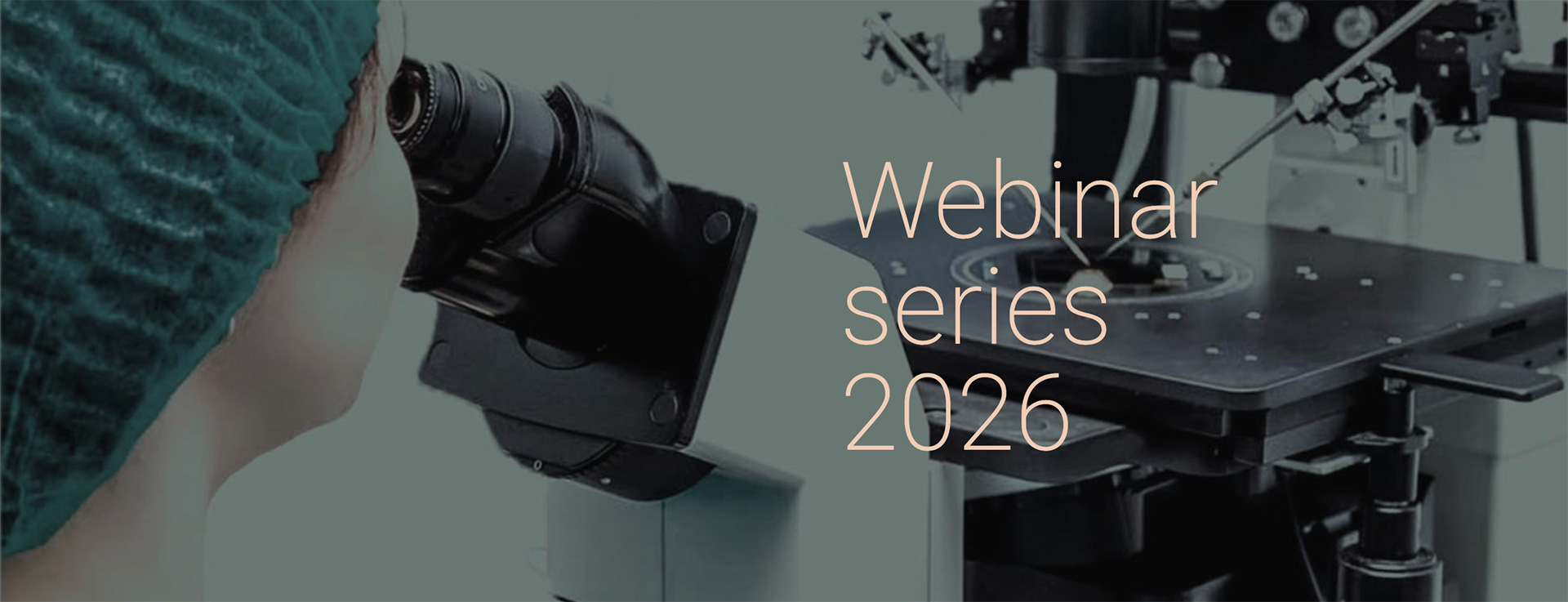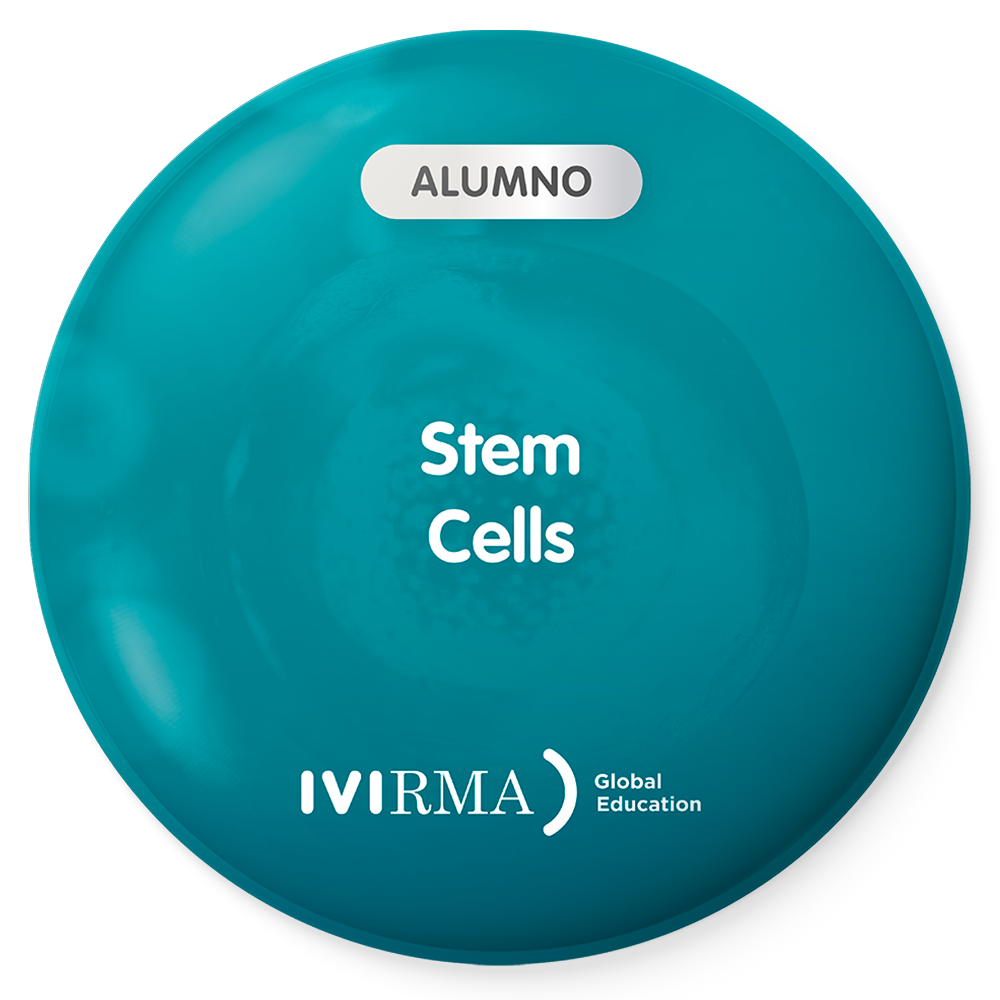Online course in Stem Cells
AREA: Assisted Reproduction, Research
LANGUAGE: English
PLACES: 15
STUDENTS: 0/15 (0%)
START DATE & END:
11/08/2026 – 15/09/2026
MODALITY: Online
CENTER: IVIRMA Global Education
Online course in Stem Cells
AREA: Assisted Reproduction, Research
LANGUAGE: English
PLACES: 15
STUDENTS: 0/15 (0%)
START DATE & END:
11/08/2026 – 15/09/2026
MODALITY: Online
CENTER: IVIRMA Global Education
Online course in Stem Cells
AREA:
LANGUAGE: English
ProgramData

Start date and end:
11/08/2026 - 15/09/2026

Enrollment:
350 €

Location:
IVIRMA Campus

Hours:
20 theoretical

Type:
Online courses

Organizer center:
IVIRMA Global Education
Description
We will describe the basic concepts about stem cells, types according to their origin and differentiation potential. We will delve into the possible applications of Regenerative Medicine to heal and repair organs and tissues through cell replacement therapy with its advantages and disadvantages.
We will study each type of stem cell according to its differentiation potential from pluripotent cells such as human embryonic stem cells to induced pluripotent cells whose discoverer was awarded with the Nobel Prize in Medicine in 2012. We will analyze somatic stem cells and those that have been identified in organs and reproductive tissues: ovaries, testes, endometrium, myometrium, and umbilical cord blood.
We will study germ stem cells, which are haploid sex cells that can be obtained from embryonic stem cells or by somatic cell transdifferentiation.
We will review the legal and ethical foundations that handle studies with these cell types.
Biomedical Professionals, Biotechnologists, Andrologists and Embryologists
Academic information
Competencies
Learning outcomes expected to be acquired by the student at the end of the course:
1. Define basic concepts about stem cells, the types according to their origin and their potential for differentiation.
2. Distinguish embryonic stem cell derivation, culture, and characterization.
3. Identify the differentiation techniques of germ cells and gametes.
4. Recognize the somatic stem cells and those identified in reproductive organs and tissues.
5. Evaluate the possible applications of Regenerative Medicine to heal and repair organs and tissues through cell replacement therapy.
6. Determine the bioethical aspects that must be considered in the study and application of stem cells, as well as their moral implications, according to legislation.
Course Coordination:
Irene CervellĂł Alcaraz
View profileProgram
1. Stem cells. Therapeutic possibilities. Regenerative Medicine
2. Pluripotent stem cells: types and general aspects
3. New Technologies in Reproductive Medicine: Organoids and Microfluidics
4. Multipotent cells: umbilical cord
5. Perinatal stem cells: umbilical cord tissue
6. Gamete generation from stem cells: reprogramming and transdifferentiation
7. Adult stem cells in human testicles
8. Adult stem cells in Myometrium and Fibroids
9. Adult stem cells in the human endometrium
10. Fertility preservation
11. Ovarian rejuvenation and stem cells: applications and future perspectives
12. Uterus transplantation
13. Tissue Bioengineering and Regenerative Medicine in Reproduction
14. Bioethics and legislation of stem cell research
15. Therapeutic Applications of Stem Cells
Cancellation and Refund Policy
Once the course has started, enrollment cancellation will not be possible, and no refunds will be issued under any circumstances.
Theoretical-practical courses are designed as an indivisible training unit; therefore, no refunds will be granted once the course has begun, even if the practical component has not yet started.
Course Completion
A course will only be considered successfully completed when the student has fully completed the entire program. If the course includes a practical component, it will not be deemed completed unless that component has been fully carried out.
No certificate of completion or attendance will be issued if the student has not completed all the activities included in the course program. Under no circumstances will certificates be issued for partial completion of either the theoretical or practical parts of the course.
Related courses

Online
Molecular control of follicular dominance and atresia – Casarini
Start: 17/02/2026
Webinars
Course fee:
Free

Online
Past, present and future of sperm assessment -Garrido
Start: 18/02/2026
Webinars
Course fee:
Free

Online
Embryo plasticity: cellular and molecular aspects – Coticchio / Ottolini
Start: 24/02/2026
Webinars
Course fee:
Free
11/08/2026 – 15/09/2026
20 theoretical
IVIRMA Campus
350 €
Program Data
IVIRMA Campus
This course is accredited by the European Accreditation Council for Continuing Medical Education (EACCME). Once course is completed you will be awarded with 20 ECMEC´s credits. More info in FAQ´s.
Intended for
Biomedical Professionals, Biotechnologists, Andrologists and Embryologists
Description
We will describe the basic concepts about stem cells, types according to their origin and differentiation potential. We will delve into the possible applications of Regenerative Medicine to heal and repair organs and tissues through cell replacement therapy with its advantages and disadvantages.
We will study each type of stem cell according to its differentiation potential from pluripotent cells such as human embryonic stem cells to induced pluripotent cells whose discoverer was awarded with the Nobel Prize in Medicine in 2012. We will analyze somatic stem cells and those that have been identified in organs and reproductive tissues: ovaries, testes, endometrium, myometrium, and umbilical cord blood.
We will study germ stem cells, which are haploid sex cells that can be obtained from embryonic stem cells or by somatic cell transdifferentiation.
We will review the legal and ethical foundations that handle studies with these cell types.
Skills
Learning outcomes expected to be acquired by the student at the end of the course:
1. Define basic concepts about stem cells, the types according to their origin and their potential for differentiation.
2. Distinguish embryonic stem cell derivation, culture, and characterization.
3. Identify the differentiation techniques of germ cells and gametes.
4. Recognize the somatic stem cells and those identified in reproductive organs and tissues.
5. Evaluate the possible applications of Regenerative Medicine to heal and repair organs and tissues through cell replacement therapy.
6. Determine the bioethical aspects that must be considered in the study and application of stem cells, as well as their moral implications, according to legislation.
Students info
Important information:
The online course will be carried out through the e-learning platform: IVIRMA Campus. The student will receive a message with the access information and credentials 24/48 hours before the start of the course.
To successfully complete the training and obtain the corresponding certificate, the student must obtain a percentage greater than or equal to 70% of correct answers in the final evaluation. To do this, you will have two opportunities to take the exam.
Program
Program
1. Stem cells. Therapeutic possibilities. Regenerative Medicine
2. Pluripotent stem cells: types and general aspects
3. New Technologies in Reproductive Medicine: Organoids and Microfluidics
4. Multipotent cells: umbilical cord
5. Perinatal stem cells: umbilical cord tissue
6. Gamete generation from stem cells: reprogramming and transdifferentiation
7. Adult stem cells in human testicles
8. Adult stem cells in Myometrium and Fibroids
9. Adult stem cells in the human endometrium
10. Fertility preservation
11. Ovarian rejuvenation and stem cells: applications and future perspectives
12. Uterus transplantation
13. Tissue Bioengineering and Regenerative Medicine in Reproduction
14. Bioethics and legislation of stem cell research
15. Therapeutic Applications of Stem Cells
Coordinators
Cancellation and Refund Policy
Once the course has started, enrollment cancellation will not be possible, and no refunds will be issued under any circumstances.
Theoretical-practical courses are designed as an indivisible training unit; therefore, no refunds will be granted once the course has begun, even if the practical component has not yet started.
Course Completion
A course will only be considered successfully completed when the student has fully completed the entire program. If the course includes a practical component, it will not be deemed completed unless that component has been fully carried out.
No certificate of completion or attendance will be issued if the student has not completed all the activities included in the course program. Under no circumstances will certificates be issued for partial completion of either the theoretical or practical parts of the course.


